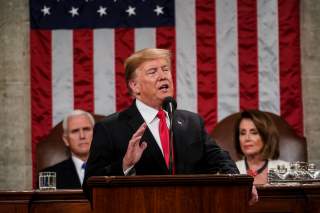The Hanoi Summit – We Asked Abigail Stowe-Thurston What Happens Next in U.S.-North Korea Relations
"There is no military option that will solve either side’s problems, leaving a diplomatic process, however messy and imperfect, as the only option for the United States and North Korea."
Editor’s Note: Looking for more opinions on where we go after the Hanoi summit? Check out all 80 expert takes on where U.S-North Korea relations go next here.
Despite the fact that the United States and North Korea walked away from the Hanoi summit empty-handed, American and North Korean interests are not entirely at odds with one another. The overlapping segment of this Venn diagram may be narrow, but progress depends on a willingness from both sides to negotiate within that sliver of mutual benefit.
The Trump Administration should not expect that North Korea will disarm in the near term, especially absent steps to address North Korea’s security concerns. It is equally unreasonable for the Administration to expect that there will be any appetite among Americans, South Koreans, or Japanese for a lengthy and bloody war on the Korean peninsula if North Korea does not meet an artificially imposed deadline for disarmament.
On the other hand, North Korean leader Kim Jong-un should not expect international political and economic institutions to accept North Korea while its weapons of mass destruction programs threaten countries around the world and its human rights practices threaten its own citizens.
There is no military option that will solve either side’s problems, leaving a diplomatic process, however messy and imperfect, as the only option for the United States and North Korea.
The Administration’s insistence that denuclearization is a condition for further steps sets this process up for failure. Instead, the U.S. negotiators should push for an incremental approach that focuses on near-term objectives that limit North Korea’s ability to expand and diversify its nuclear arsenal. Achieving a nuclear-weapon-free North Korea in the long term will also require addressing North Korea’s security concerns. This means that negotiations must incorporate confidence and peace-building measures alongside nuclear provisions.
Fully eliminating North Korea’s nuclear arsenal will likely take years. The difficult truth is that a successful process will not always be comfortable. Admitting to this reality does not constitute acceptance of North Korea’s nuclear arsenal, nor does it mean that North Korea is receiving more benefit from negotiating than the United States. Progress on North Korean disarmament will be contingent on the United States’ ability to make commensurate concessions without framing them as “losses” or North Korean “wins,” and it will require addressing setbacks without allowing them to spiral into crises.
Abigail Stowe-Thurston is a Program Coordinator at the Center for Arms Control and Non-Proliferation.
Image: Reuters

